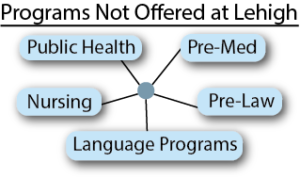
Designed by Anna Simoneau
Lehigh offers nearly 100 majors across four different colleges, yet some students face challenges when the university does not offer a particular program. In the process of discovering what they want to pursue, students also discover that the university lacks courses that align with their passions.
“My first year, I took classes in everything: international relations, political science, environmental science, etc., attempting to figure it out,” Lauren DiNapoli, ’18, said. “It took a while for me to find the health, medicine and society program and connect the dots to public health from there. At that point, I simultaneously realized that this was the major I wanted to pursue and that Lehigh didn’t offer it.”
In comparison to other peer institutions, such as Lafayette, Bucknell and Moravian College, Lehigh does not offer certain majors, minors or classes. Public health, nursing, language programs, pre-law and pre-health are examples of programs in which students are interested but are not provided fully by Lehigh.
The university announced the creation of a college of health as part of its Path to Prominence 10-year plan. The timeline for the college’s opening has yet to be announced, so students are still creating their own curriculum plans.
Cameron Wesson, the associate dean of undergraduate programs, said the reason why Lehigh doesn’t offer certain majors that other schools provide is simply due to the size and expertise of Lehigh’s present faculty and student body.
He said other considerations include whether Lehigh believes it can offer a program that is competitive with those schools that provide it and whether there is evidence that students who pursue those specific degree programs have successful post-graduate placement prospects. In addition, Lehigh also considers if those proposed programs require new faculty and resources.
“We have very few students who choose to design their own majors,” Wesson wrote in an email. “There are perhaps two to three students per year who do so, but these are students who have a very clear idea of what they want to study and why. They also have a very good idea of what their placement prospects after graduation are when pursuing a self-designed degree.”
DiNapoli falls under the category of a student with a designed major, but she didn’t let the absence of a public health major stop her. Instead, she created and is pursuing a combination of disciplines that aligns to its typical values and course work
On paper, she is an anthropology and HMS double major with a minor in biology. Although Lehigh didn’t fulfill all of her specific interests, she is a firm believer that taking such a specialized course load will give her an advantage later on in the work force and in life.
Megan Reilly, ’18, also came to Lehigh undecided about her major, but she knew she wanted to pursue a health profession. Like DiNapoli, Reilly was interested in a field where Lehigh lacked classes.
“It was really a debate whether I wanted to do physical therapy, occupational therapy or instead go into something like public health,” Reilly said. “I decided on physical therapy pretty early on, only afterwards realizing that Lehigh didn’t offer two of three prerequisites (depending on the graduate program).”
Compared to other schools, Lehigh lacks majors in health, communications, law and film fields. Schools like American University, Bucknell, Lafayette and Boston College all have film studies. Moravian provides pre-law, public health and rehabilitation sciences.
However, the process of adding more majors isn’t as simple as it may sound.
Wesson said the process requires the faculty to propose the new program to the provost, president and board of trustees.
If the new degree program is supported, the university needs to find faculty members who would like to offer the program and submit a formal proposal including the number of credit hours required, the specific courses needed, details on precisely who would be teaching those courses and an estimate of the number of students the program would attract. The administration, the College Policy Committee, the faculty of the college, the Educational Policy Committee and the entire Lehigh faculty would then have to support the proposal.
“The College of Arts and Sciences is always looking for ways to better serve our students and prepare them for life after Lehigh,” Wesson said. “But we only pursue new academic programs when they are consistent with our strategic plan (and) have ample support from faculty, students and the administration.”





Comment policy
Comments posted to The Brown and White website are reviewed by a moderator before being approved. Incendiary speech or harassing language, including comments targeted at individuals, may be deemed unacceptable and not published. Spam and other soliciting will also be declined.
The Brown and White also reserves the right to not publish entirely anonymous comments.
1 Comment
Lehigh was the wrong choice of schools for physical therapy or nursing & anyone who chose Lehigh for those majors didn’t do their homework. Suggest students who made that mistake simply transfer to Moravian or American etc instead of pressing Lehigh to develop more majors outside their core strength.